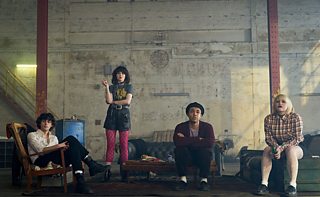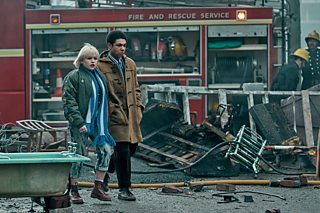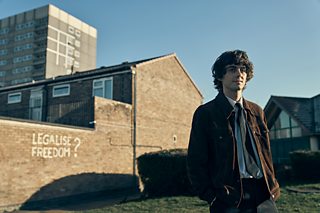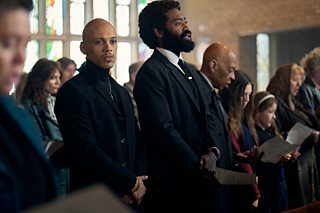Creator, writer and executive producer Steven Knight and director Paul Whittington introduce the new drama This Town.
This Town comes to ±«Óãtv One and ±«Óãtv iPlayer from Sunday 31st March at 9pm
Watch the trailer for This Town, a brand new six-part series from Peaky Blinders and SAS Rogue Heroes creator Steven Knight. Set in a world of family ties, teenage kicks and the exhilarating music of a generation, This Town tells the story of a band’s formation against a backdrop of violence, capturing how creative genius can emerge from a time of madness.
How would you set the scene for This Town?
Steven Knight (writer) - The setting and backdrop for This Town is 1981, Birmingham and Coventry. ‘81 was a time of turmoil and change in every sense - in society, in politics but in music as well. This series opens with a riot and I hope the sense of ‘riot’ continues throughout the whole thing. , it happened in Handsworth, Birmingham and I’ve used that to introduce four very different characters who will come together.
You might say it’s about music or it’s about people who are drawn to a certain type of music, but I’ve tried not to do that. I didn’t really want to do a thing about people who form a band, which is part of what it is, I wanted to create a group of people who have no choice other than to form a band because all the other options are so bleak. Having said that I hope ‘bleak’ isn’t a word that people use to describe this, because what I’m trying to do is meet these people living their lives on big, sprawling housing estates in the early 80s and it’s beautiful. The place is beautiful. The series is not trying to say ‘isn’t it awful’.

Bardon Quinn (BEN ROSE); Fiona (FREYA PARKS); Dante Williams (LEVI BROWN); Jeannie Keefe (EVE AUSTIN) in This Town (Credit: ±«Óãtv/Banijay Rights, Kudos Photographer: Robert Viglasky)
Where did the idea for This Town come from and why did you want to write this story?
Steven - It originated with , the production company, who suggested creating something to do with this sort of music. That struck a chord with me because this was the era when I grew up and I’m from similar places to where the music originated.
At the time it seemed completely normal, but when you look back there was a period when in Coventry and then Birmingham that a certain sort of music appeared. Suddenly everyone seemed to come together regardless of differences like race. You’d go to a Birmingham football match and go to the pub after the match and someone would turn up with a record player and plug it in and everyone was united. The point being that it wasn’t deliberate or forced, or anyone at the time said “this is good”, it just happened. Music was everywhere. Not just the younger generation but parents and uncles and aunties would have a party and everyone would turn up and everyone had their song which they did. People were just singing all the time. In pubs people would sing.
I thought it would be interesting to tell a story set at that time. I tried not to tell a story of four people who form a band but four people in very very difficult circumstances which they can only escape from if they form bands.

Dante Williams (LEVI BROWN);Jeannie Keefe (EVE AUSTIN) in This Town (Credit: ±«Óãtv/Banijay Rights/Kudos Photographer: Robert Viglasky)
Music is such a force of hope for so many of us, especially at that time of your life?
Steven - Music appeals to some part of your psyche that isn’t rational or reasonable. The characters are not seeking it out or trying to find it – this thing is finding them. A lot of the character stuff is based on real people’s experiences – the character of Gregory for example. I’m trying to get the reality of people’s lives into the story, the unusualness of reality.
What part does music play for the different characters?
Steven - For each character there is a role for music. For Bardon music for him is this Irish rebel music, it represents what his dad does, the danger, the jeopardy and the thing he doesn’t want. For Dante it’s words and he can’t cope with how they come to him, he needs to get them away. For Deuce, Dante’s dad who is a preacher, there is gospel music which for him is the lifeline to save him from addiction. Estella, Bardon’s mum, could’ve made it in the 60s and 70s, because she is a brilliant singer – and luckily Michelle Dockery is also a brilliant singer. For Estella music is what might’ve been. It’s a different thing for all of them but it fits when they all come together.

Bardon Quinn (BEN ROSE) in This Town (Credit: ±«Óãtv/Banijay Rights/Kudos Photographer: Robert Viglasky)
The setting is so vital to the story?
Steven - Yes, there are these two council estates, and you could approach it by saying ‘isn’t it a shame, these poor people’ but for people who live there you don’t think like that. It’s brilliant, it’s glamorous and it’s dramatic. The idea is that those blocks look beautiful.
And all the influences and sounds come together to make this series unique?
Steven - I think so. We’ve been so fortunate with our performers and our director and the people who have contributed music, so I’m really excited about that – by the time you get to episode six it’s on fire!

Gregory Williams (JORDAN BOLGER);Deuce Williams (NICHOLAS PINNOCK) in This Town (Credit: ±«Óãtv/Banijay Rights/Kudos Photographer: Robert Viglasky)
Paul Whittington - Director
I read Steve’s script a couple of years ago now and I know it sounds like a cliché but it was one of the best scripts I’d ever read. The energy really leapt off the page and the vitality of these characters. Also, it’s interesting that it’s a very personal piece for Steve because actually it felt very personal for me too. The more personal you make something in the writing of it then the more universal it becomes. All the themes of being that age, being a teenager and that search for identity, ‘Who am I? Who is my tribe?’ Expressing that through the music that you listen to and the clothes that you wear – I think that’s something that we can all relate to.
I have a particular nostalgia for it because I remember that time, I’m from the Midlands too. It’s nostalgic but also universal thematically. You could set this story at any stage of history since the invention of the teenager!
How do you recreate those locations at that time?
Paul - Birmingham offers a lot in terms of the locations and people were very welcoming to us. If you say you’re working with the guy who created Peaky Blinders the doors open! The Brummies are rightly very proud of that show.
We found an area called in Birmingham – a sprawling estate with green spaces and woodland and then a location in Coventry that we wanted to be a bit more insular and inward looking – an incredible estate that has a large tower in the centre and four low rise blocks around each side that felt like a fortress. We had these two very distinctive and different locations.
How did you select the music for the incredible soundtrack?
Paul - Steve had written a lot of stuff into the script. Reading the script with a playlist in your head brought a lot to life. We also had a fantastic composer, , who wrote all the original music. He brought that time together with something that feels very contemporary.
Watch an interview with Steven Knight
Did you think ‘oh no I didn’t get this song in’?
Steven – I really tried not to think about it in terms of, it’s got to be about music or have a forensic analysis of what music was there at the time or even worse, try and be pure about things. It’s not based on the story of any specific band. People were listening to all kinds of different music. That’s why I wanted Leonard Cohen in there – just the last thing you’re expecting.
Steven this is the first production out of your new Birmingham studios isn’t it? How important is that?
Steven - We did it before we were ready, which was good! It’s a project that I’ve been working on for about eight or nine years, to get a studio there in Digbeth which is quite a rough but also cool bit of Birmingham with lots going on. We’ve got 20 acres of land with a mix of industrial warehouses and Victorian architecture. I love it. We’ve got Masterchef moving in and a lot more stuff coming. For me to be shooting in Birmingham was incredibly important. I love I think it’s beautiful! There’s a lot of in this show! I just wanted to take the bits of Birmingham that I’ve always thought are just amazing and great to look at and put them on screen and see if anybody agrees.
When you were writing the show did you have more than one season in mind?
Steven – Yes definitely. I think if you’re going to write a show you have to think that you’re going to be with these people for quite a long time and you’re going to get to the end of their journey. What’s good about television rather than film is that you can have a character who is unsympathetic for a long time and then redeem them. There’s always a thought that these characters are going to mature over quite a long period of time.
What’s the connection to the political context of the time and does it have contemporary resonance?
Steven - I think yes, fracture and destruction of society and pessimism. My intention was to take all of that bleakness and then find out that people will make it through. These characters are in very, very difficult circumstances, not through any fault of their own, and find ways to get out of them. At least you can have a laugh and a song.
Watch This Town on ±«Óãtv iPlayer and ±«Óãtv One from Sunday 31st March
